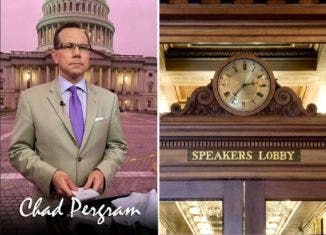The (Spin) Doctors are In
The Speaker’s Lobby: The (Spin) Doctors Are In
By: Chad Pergram
01 September 2009
Here’s why it’s tough to figure out who’s accurate in the health care debate now raging in Congress.
Congressional Democrats, starved for votes as lawmakers prepare to return in September, blasted out an email the other day extolling an evaluation of their health care plan by the Congressional Budget Office (CBO), the official actuary of Capitol Hill.
The headline claims that “CBO Confirms Lower Prescription Drug Costs For Seniors Under H.R. 3200.”
The Democrats announced that the CBO says they’ve ended the “donut hole” in drug coverage for seniors. The Medicare Part D program helps cover the cost of some medications. The donut hole is a gap between where the government pays for prescription drugs and where catastrophic benefits begin for those enrolled in Medicare Part D.
The chairmen of the major committees who penned the health care package trumpeted the CBO report.
“Health care reform will reduce Medicare Part D costs for seniors by eliminating the immense gap in coverage, which currently forces seniors to pay premiums but get nothing in return,” said Ways and Means Committee Chairman Charlie Rangel (D-NY).
“This CBO score confirms that our reforms will make prescription drug costs more affordable for seniors. And that drug companies can no longer reap enormous profits at their expense,” said House Education and Labor Committee Chairman George Miller (D-CA).
The CBO report says that seniors who pay $12,000 out of their own pockets for medication would save $5,000 under the Democratic health bill.
Of course, within minutes of Democrats exalting the CBO’s finding, Republicans returned fire with their own press release. The top GOPer on the House Ways and Means Committee, Rep. Dave Camp (R-MI), pounced on the CBO report. Of course Camp painted a universally different interpretation of the Democrats’ boast.
“CBO Says Seniors Will Pay 20% More for Prescription Drug Insurance if the House Democrat Health Care Bill is Enacted,” Camp’s announcement asserted.
Camp says CBO sent him a letter declaring that “the net effect on drug spending would differ among beneficiaries depending on their purchases in a year.” Camp’s statement notes that 3.8 million seniors encountered the donut hole in 2007. And only 11 percent of them “would save money under the Democrats’ health care bill.” However, Camp then says that the Centers for Medicare and Medicaid Services estimates that 12 million Americans would pay more for their prescription drugs if the Democrats have their way.
So who to believe?
I don’t know. And no one else does, either. It all depends on who you decide to believe. So what are we left with? The essence of spin and propaganda. Every positive claim countered with a negative one. Every negative one parried with a positive one. Deploying information. Appealing to emotions. Ad hominem attacks on the other side. Anything to mold people’s viewpoints.
There is a distinct difference between spin and propaganda. But both are at work in force during the present health care tussle.
Spin is just an effort to creatively twist the facts. For instance, baseball pitchers apply “spin” all the time. It’s one thing to hum a fastball right down the heart of the plate. But most big league hurlers also brandish an arsenal of pitches that dance, gyrate and fade all over the place: a knuckleball, a slider, a cutter, a curve. The trick is to deceive the batter into expecting one pitch. Then the bottom falls out and he realizes he’s faced something else.
Politicians are like pitchers. And in political spin, they creatively manipulate facts to either embellish their own cause or tarnish the other side. But spin is focused more narrowly than propaganda. It’s usually an effort to cast one set of facts to meet one’s political goals.
For instance, Republicans nearly lost control of Congress in 1998. But then-House Speaker Newt Gingrich (R-GA) hailed the 1998 election as a GOP achievement. Gingrich said that even the last Republican majority wasn’t able to hold control of Congress for even two consecutive elections back in the 1940s and ‘50s, let alone three.
That’s spin. Contouring a negative into a positive. Cherry picking certain facts for political gain.
Propaganda is a broader gambit. Not just selectively arcing facts and figures to favor your side. But ginning up support for a more expansive cause.
The word propaganda is derived from “propagate.” As in “propagate the faith.” St. Paul did just that by organizing the first Christian churches in what became Italy and Greece. If you’re in Rome, you can stroll up Via di Propaganda to reach The Palazzo di Propaganda Fide. Translation: The Palace of the Propagation of the Faith, which is incidentally operated by the Vatican.
Soon, propaganda wormed its way into politics, mostly as a tool to stir support for war. The U.S. sold Liberty Bonds during World War I. Tokyo Rose commanded the airwaves in World War II with patter tailored to unnerve U.S. troops in the Pacific. She bantered about the positions of platoons and even called out the names of specific GI’s.
In Iraq, Saddam Hussein’s information minister Mohammad Saeed al-Sahaf earned the moniker “Baghdad Bob” after coughing up these gems after U.S. troops invaded in 2003: “There are no American infidels in Baghdad” and “Be assured, Baghdad is safe. Protected.”
So Democrats and Republicans alike are blitzing the public with a fusillade of propaganda. Both sides are chattering about the access people will have to physicians. But at the health care debate rages, it seems the only doctors everyone is guaranteed to see are the spin doctors.
– Chad Pergram covers Congress for FOX News. He’s won an Edward R. Murrow Award and the Joan Barone Award for his reporting on Capitol Hill.

